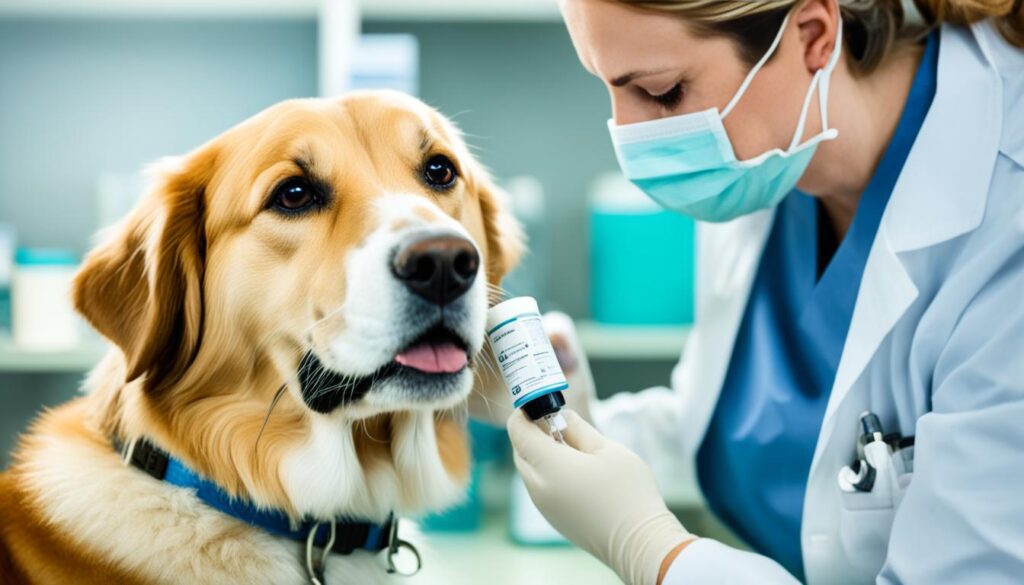Navigating the Costs of Dog Vaccinations

Did you know that the average cost per shot for dog vaccinations can range from $20 to $60? That’s a significant expense to consider when prioritizing your dog’s health and budgeting for their care.
When it comes to dog vaccinations, the cost can vary depending on factors such as the specific vaccine and the location where you get your dog vaccinated. Puppy vaccination costs may be slightly higher due to the need to follow a vaccination schedule that includes a series of shots and boosters starting at six to eight weeks of age.
Not only do you need to consider core vaccines such as the rabies vaccine, which is administered yearly, but also non-core vaccines that may be necessary based on your dog’s breed, lifestyle, age, and overall health. By keeping your dog up to date on vaccinations, you not only help prevent potentially fatal diseases but also reduce future vet bills.
Understanding Puppy Vaccinations
Puppies require a series of vaccinations to protect them from common infectious diseases. The core vaccines for puppies include the distemper vaccine, which protects against distemper, adenovirus type 1 (hepatitis), adenovirus type 2 (kennel cough), parainfluenza, and parvovirus. Other core vaccines include the rabies vaccine, which is required by law in most states, and the leptospirosis vaccine, which helps prevent a bacterial infection that can cause kidney and liver damage.
Non-core vaccines, such as the Bordetella vaccine (kennel cough) and the Lyme disease vaccine, may be recommended based on your puppy’s lifestyle and risk factors.
The puppy vaccination schedule typically starts at six to eight weeks of age and includes multiple rounds of vaccinations and boosters. It’s important to follow the recommended schedule to ensure your puppy builds immunity against diseases. Consult with your veterinarian to create a customized vaccination plan for your puppy.
Core Vaccines for Puppies:
- Distemper vaccine: Protects against distemper, adenovirus type 1, adenovirus type 2, parainfluenza, and parvovirus.
- Rabies vaccine: Required by law in most states.
- Leptospirosis vaccine: Helps prevent a bacterial infection that can cause kidney and liver damage.
Non-Core Vaccines for Puppies:
- Bordetella vaccine: Protects against kennel cough.
- Lyme disease vaccine: Recommended for puppies in areas with a high risk of Lyme disease.
When it comes to the cost of puppy vaccinations, it can vary depending on the specific vaccine and the location where you get your puppy vaccinated. On average, the cost per shot ranges from $20 to $60. It’s important to budget for these expenses and factor them into your overall pet care costs.
Understanding Dog Vaccinations for Adult Dogs
Adult dogs require proper vaccinations to ensure their ongoing health and protection against common diseases. These vaccinations consist of core vaccines, which are typically required by law, and non-core vaccines that may be recommended based on your dog’s specific lifestyle and risk factors.
Core Vaccines:
The core vaccines for adult dogs include:
- Rabies vaccine
- DA2PPv vaccine (distemper, adenovirus type 1, adenovirus type 2, parainfluenza, and parvovirus)
The rabies vaccine is generally mandatory and must be administered in accordance with local laws. The DA2PPv vaccine protects against several highly contagious diseases that can significantly impact your dog’s health. It is commonly given on a yearly basis to maintain immunity.
Non-Core Vaccines:
Non-core vaccines may be recommended based on your dog’s lifestyle and specific risk factors. These vaccines are designed to protect against diseases that are more prevalent in certain environments or situations. For example:
- Bordetella vaccine may be recommended for dogs who frequently have contact with other dogs, such as those who visit parks, kennels, or participate in dog shows or daycare.
- Canine influenza vaccine may be recommended for dogs who are exposed to areas with a high incidence of canine influenza virus.
- Lyme disease vaccine may be recommended for dogs living in regions with a high risk of tick exposure.
Consulting with your veterinarian is crucial in developing an appropriate vaccination schedule tailored to your dog’s individual needs. They will consider factors such as your dog’s age, breed, health history, and lifestyle to determine the best course of action.
Vaccination Frequency and Cost:
The frequency of dog vaccinations can vary depending on the specific vaccine. Some vaccines require boosters every year, while others may only need to be administered every two to three years. It is essential to follow your veterinarian’s guidance to ensure your dog’s immunity remains strong.
The cost of dog vaccinations, including both core and non-core vaccines, typically ranges from $20 to $60 per vaccine. However, prices may vary based on the specific region and veterinary clinic. It’s always a good idea to inquire about the costs beforehand to plan your budget accordingly.
By staying up to date on vaccinations and working closely with your veterinarian, you can provide your adult dog with the necessary protection against diseases, ensuring their long-term health and well-being.

Conclusion
Managing the cost of dog vaccinations is crucial for ensuring the health and well-being of your beloved pet. By understanding the different types of vaccines your dog may require, including core and non-core vaccines, you can collaborate with your veterinarian to create a customized vaccination schedule that meets your dog’s specific needs.
It’s essential to budget not only for the initial puppy shots but also for the ongoing costs of booster shots and annual vaccinations. To help minimize vaccination expenses, you can explore options such as low-cost vaccination clinics, nonprofit organizations, and veterinary schools that may offer discounted or subsidized vaccination services.
An additional way to manage the cost of dog vaccinations is by considering pet insurance with wellness coverage. This type of insurance can help offset the expenses of routine preventive care, including vaccinations. Alternatively, you can create a separate savings account dedicated to your pet’s healthcare expenses, ensuring you have the necessary funds readily available.
By prioritizing proper vaccination and regular veterinary care, you can provide your dog with optimal protection against preventable diseases. Investing in your dog’s health today will not only save you future vet bills but also contribute to a long and happy life for your furry friend.






